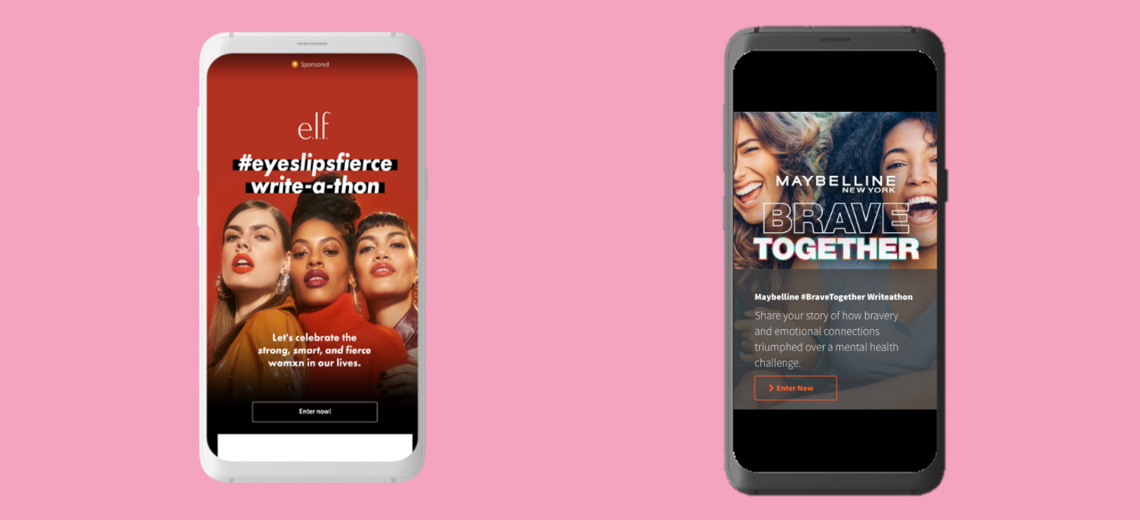Gen Z may be known for their love of short video content, but brands are finding that long-form stories are still a way to reach them.
Maybelline, E.l.f. Beauty and Clean & Clear are among the brands in the beauty and personal care spaces that have recently hosted campaigns on Wattpad, a platform where users write and share stories ranging from original fiction and fan fiction to personal accounts. Founded in 2006 and acquired by South Korean tech company Naver in 2021, 80% of Wattpad’s 94 million users are Gen Z, according to the platform. U.S.-based users make up 20% of the total. With 84% of users identifying as female, beauty brands have begun to tap into the audience.
“Wattpad dispels the myth that Gen Z has a short attention span and [that they] operate on this weird superficial level,” said Jeanne Lam, president of Wattpad. “That is 100% the antithesis of what we see.”
Most recently, Maybelline launched the second year of its #BraveTogether Wattpad “write-a-thon” campaign. First held in May 2021 for National Coming Out Day, the campaign received over 84 million impressions and 37,000 story submissions for its first iteration. Maybelline launched a second write-a-thon in May 2022 for Mental Health Awareness Month, asking users to submit stories based on a series of four writing prompts released each week. When users added the campaign hashtag to their submitted stories over the course of May, $1 was donated to charity per story submitted, with $10,000 each going to Sad Girls Club, The Jed Foundation, The Ali Forney Center and The Loveland Foundation. Each weekly writing prompt corresponded to one organization — on May 9, for example, the Loveland Foundation prompt asked users to share a story of a time they showed bravery in the face of personal challenges.
The platform’s long-form story content format was ideal for Maybelline’s focus on mental health, said Jessica Feinstein, senior vice president of marketing for the U.S. at Maybelline.
“We’ve tried different things on all different platforms, but you want to connect the messaging with the right platform and lay out whatever your objectives are, in order to identify the platform to play with,” she said.
As for the brand’s focus on sharing mental health resources, “Is that something you necessarily want to put in a 10-second TikTok?” she said. “It’s very hard to explain [in that format]. And it’s not as relatable, in the long run.”
“A lot of the readers and writers on the [Wattpad] platform were the Gen-Z audience, looking to talk about mental health issues,” said Claire Buxton, assistant vp of brand engagement at Maybelline. “[It] felt like such a perfect fit to amplify our message.”
Wattpad first started offering sponsored content options around five years ago, with Schick being among the earliest adopters in 2017. Three years ago was the “inflection point” for branded content on the platform, said Lam.
E.l.f. Beauty’s June 2021 #EyesLipsFierce campaign on Wattpad, meanwhile, received 10,000 entries following a prompt for users to talk about a woman in their life who is fierce. The campaign resulted in 45 million media impressions and 182,000 reads of tagged stories.
The platform works directly with brands to create writing prompts on the platform.
“We leverage a lot of data to inform how we serve the right stories to the right person at the right time, because there are so many different types of stories,” said Lam. “[Wattpad is] really just a mirror to what’s happening in society and when people want to deeply engage,” she said. Often, pop culture impacts popular topics. For example, a current trending topic is “regency” fiction inspired by “Bridgerton.”
Beauty brands are also enlisting Wattpad influencers to get the word out about campaigns. Maybelline, for example, worked with Meghan Joyce Tozer (@EmilyLindin/ Night, Forgotten), Sondi Warner (@Sondi_Is_On/ Lead Me Astray), and Kassandra Tate (@famouxx/ The Famoux).
As authenticity and rawness become key for marketing to Gen Z, Wattpad is a platform for reaching them beyond hyper-curated, polished social media posts.
“Instagram is a picture, and it’s often a world that’s idealized versus what’s real,” said Feinstein. “This is a platform where people are able to provide details and share their stories in a broader format than just a picture on a caption.”




